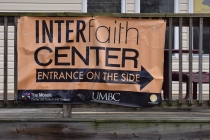
Katie Lee for TRW
Churches in southern California have begun in recent months to build a modern day underground railroad – rallying members of their congregations for the possibility that one day soon they might need to shelter or escort members of that congregation out of the country, likely over the Canadian border. While this move might seem dramatic, it serves as an appropriate statement in response to the chaos today’s politics have caused for the United States’ vast and varied immigrant populations.
While we live in inarguably and treacherously divided times, many college students can take solace and find haven on their respective campuses – shelter that is unique in nature and not found in communities that house much diversity of age. UMBC is one of the inclusive and consequently welcoming communities of this kind.
In 2016, nine colleges across the United States, both public and private, declared themselves sanctuary campuses. Similar to the idea of a sanctuary city, the self-declared campus sanctuaries do not work with immigration officials to remove students and do not give information to these officials that could put the student’s legal status in danger.
In an email sent out to all UMBC faculty and staff in November of last year, President Hrabowski danced around the idea. He addressed a letter signed by UMBC faculty, students, alumni and staff asking for the administration to make UMBC a sanctuary campus, but declared instead that UMBC was looking to “better understand options available to [it].”
It is now March of 2017 and the world has since changed in dramatic and merciless ways. The travel ban that Steve Bannon’s proxy, Emperor Trump, has instituted has imperiled the lives of millions of Americans and threatens to destroy what makes America great.
Sitting in a plastic-cast wooden booth in UMBC’s commuter lounge, Amy Skariah, a first generation American and a sophomore social work major, held her gaze steady. She said, “I think the ban is absolutely ridiculous! I automatically identify with someone from one of the countries, you automatically root for them.”
She held the palms of her hands to face the ceiling with the tips of her fingers extended outward, obviously of Caucasian decent and said, “Your family was in the same situation not too long ago too!”
The point Skariah makes is salient. Trump’s travel ban is based on the innately racist and prejudiced views of the previously hidden side of America that got him elected to the office of President. The ban was not instituted for reasons of national security, nor for the safety of American citizens.
In truth, the travel ban was not enacted to keep danger out of the United States. It is a social declaration, one of hate and exclusion. If the United States government regularly enacts policy meant to send a message of exclusion, UMBC should do what is right and enact policy that sends a message of inclusion.
While the declaration of a sanctuary campus would mean certain changes for the way UMBC operates, it would have a larger effect on UMBC’s campus by way of validation and support for its community. By declaring itself a sanctuary campus, UMBC would be waving the flag of rebellion and in turn punch up to morale among its socially-inclusive and diverse population.
The post Sanctuary campus: rooting for ourselves appeared first on The Retriever.





